4 ways to pronounce EM in French
Jun 03, 2024Did you realise there are actually 4 ways of pronouncing the 2 letters EM in French?
If you’ve got into a habit of pronouncing only the English way, even when you’re speaking in French then this mini-lesson is just right for you!
Head in and discover:
- 4 ways to pronounce EM in French like a native
- Practice of the sounds with explanations
- A mini challenge text for you to listen and work out which sound you’re hearing.

4 factors to produce the perfect pronunciation
When it comes to pronunciation, there are some elements you pay attention to. These are:
- tongue position
- air flow
- mouth position
- intonation
Indeed, whether you want to produce the letter “l” or “r” in French, you won’t put your tongue in the same position. For the first one, your tongue will touch your palate while for the second letter, it will be at the back of your throat. By the way, for vowels, the tongue position is always the same since it will stay at the bottom of your mouth to allow the maximum of air to go through.
The air flow varies according to the letter. As we just mentioned, for vowels the air flow is extremely abundant. For plosive letters like “p”, “b”, you can imagine that the air flow is like a bomb.
Your mouth can open in 2 ways: vertically and horizontally. Its aperture will make all the difference. The letter “o” is far more open than the letter “u” in French. Can’t you hear the difference between “é” and “è”? Well, if you pay attention to a French native, you will physically see the difference.
Finally, the intonation as the music of any language is unique. As far as French is concerned, the general rule is the intonation goes down for a normal sentence and the last syllable is stressed.
So, whenever you plan to improve your (French) pronunciation, take these 4 elements into account.

4 ways to produce the sound EM.
Look at the following words. They all share em in their spelling:
- emploi >>> job
- thème >>> theme
- chemin >>> path
- même >>> same
- semaine >>> week
- demain >>> tomorrow
- système >>> system
- systémique >>> systemic
- élément >>> element
- problème >>> problem
- empreinte >>> imprint
- remplir >>> to fill
- démarrer >>> to start
- emballage >>> packaging
- sembler >>> to seem
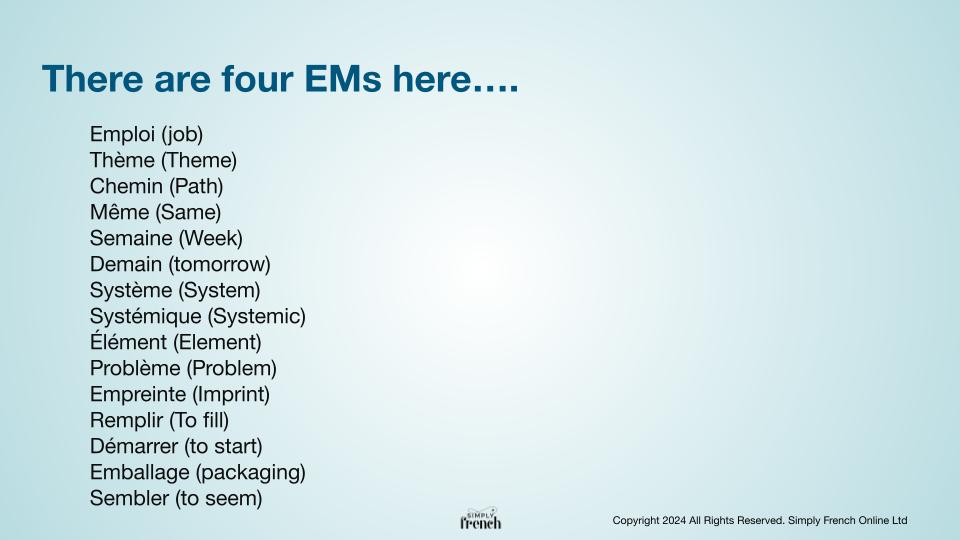
The four EMs you can find in French.
As we have mentioned, there are 4 ways to pronounce the spelling EM. It depends on the previous letter or the following one.
First, you have the one with the è or the grave accent. One example is:
- système >>> system
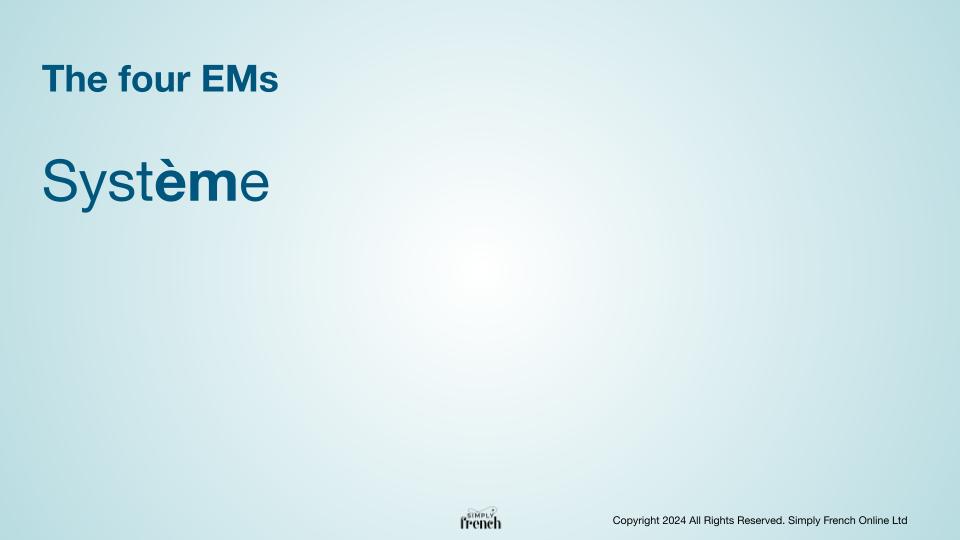
Then, you have the one with a vowel after like this illustration:
- demain >>> tomorrow
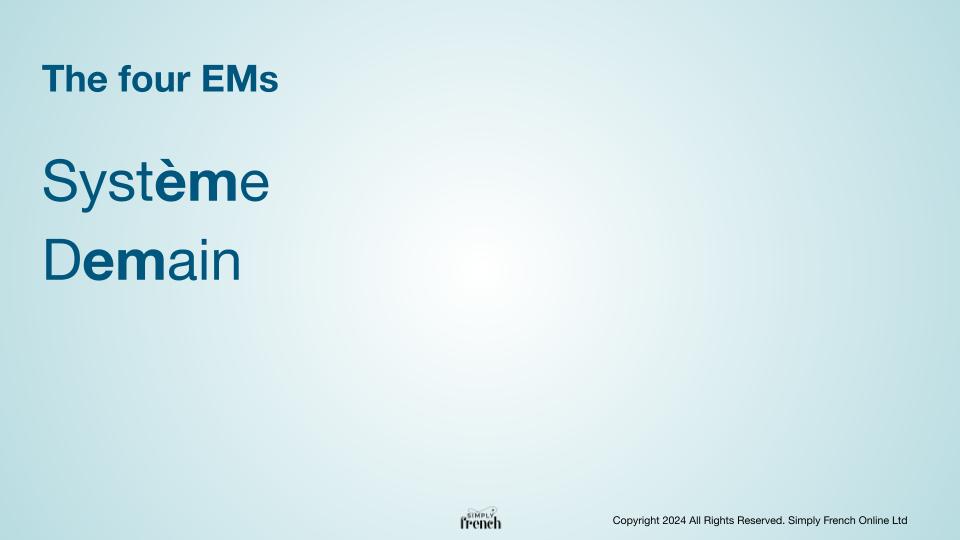
With a vowel before
- démarrer >>> to start
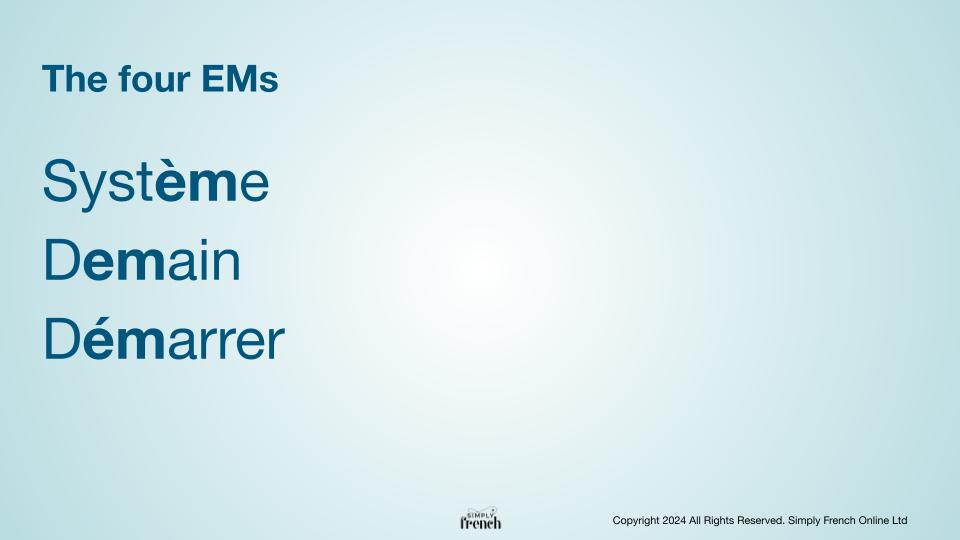
And finally, with a consonant after. For instance:
- emploi >>> job
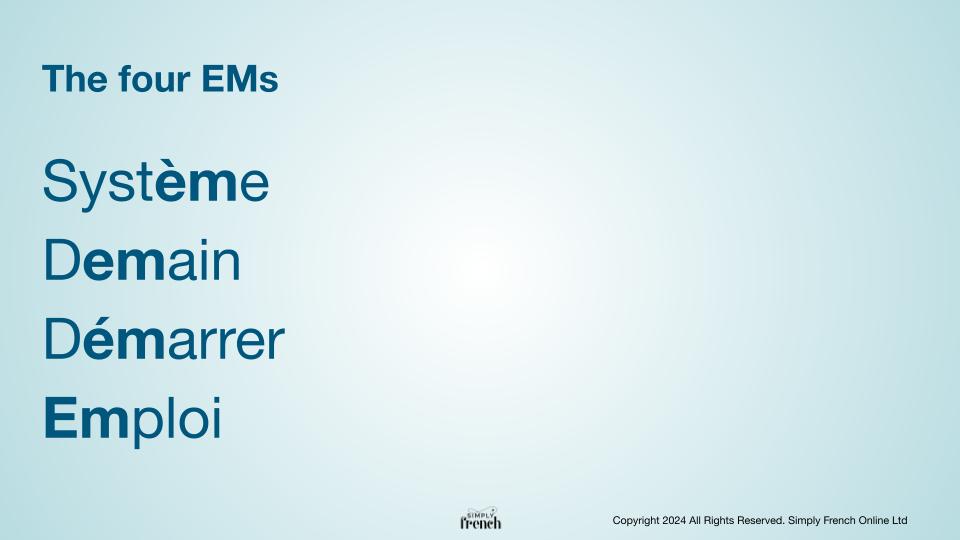
Time to see more examples for each category.
The EM with è.
With the grave accent or the circumflex one, the sound is always open. This is why you will pronounce ayyyyyym when you see EM with the accent like this ÈM.
Here are a few examples:
- thème >>> theme
- système >>> system
- problème >>> problem
And with the circumflex accent, it’s exactly the same sound:
- même >>> same
Let’s see now the words within sentences:
- Le thème de son mariage est le printemps. >>> The theme of her wedding is spring.
- Ce système . >>> This informatic system is rather complex.
- Tous les problèmes ont une solution sauf la mort ! >>> All problems have a solution except death.
- Ils ont la même voiture. >>> They have the same car.
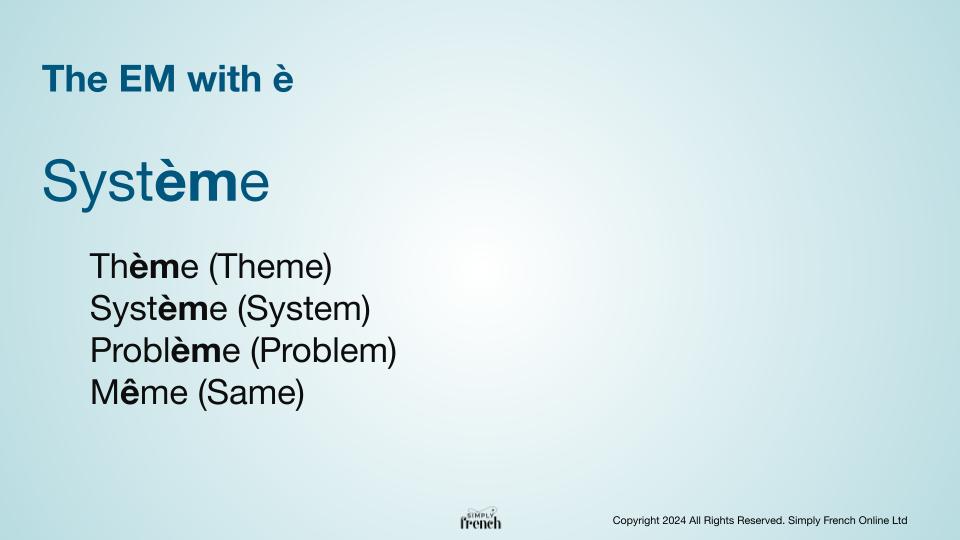
The EM with a vowel after.
Whenever you have a vowel after EM, it’s like you split the word. Let me explain. Basically, the letter E goes with the previous letter and the letter M goes with the following one. In other words, you have 2 syllables where the second syllable starts with M.
Here are some illustrations:
- chemin >>> path
- semaine >>> week
- demain >>> tomorrow
For the pronunciation, it would be more like this:
- che - min >>> path
- se - maine >>> week
- de - main >>> tomorrow
Let’s see them in sentences:
- Il y a un petit chemin pour aller à la plage. >>> There’s a small path to go to the beach.
- J’ai beaucoup de travail cette semaine. >>> I have a lot of work this week.
- Demain, c’est leur anniversaire. >>> Tomorrow, it’s their birthday.
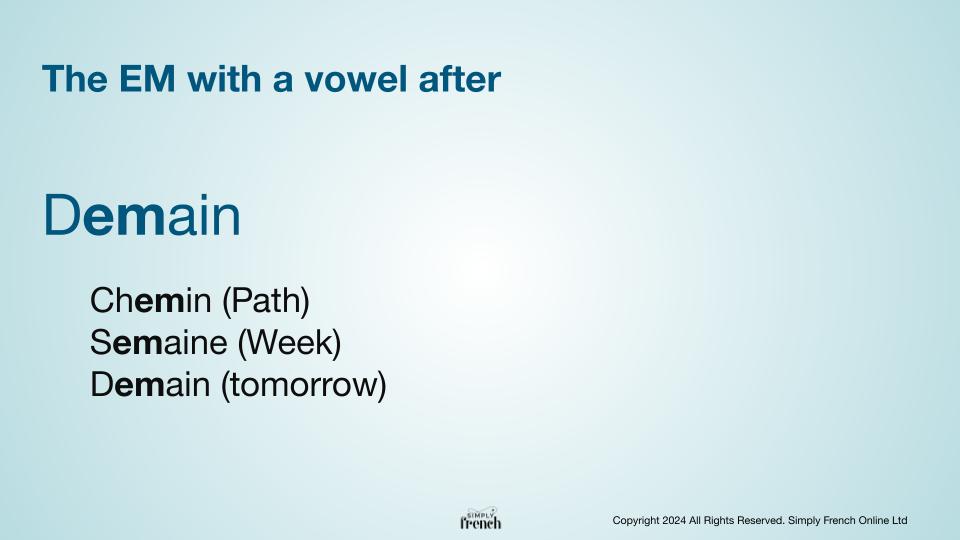
The EM with é before.
Here, it’s the opposite. Since the accent is acute, the sound is closed like whenever you use this accent in the first place.
- systémique >>> systemic
- élément >>> element
- démarrer >>> to start
With full sentences, you obtain this:
- C’est un problème systémique. >>> It’s a systemic problem.
- L’eau est un élément essentiel pour vivre. >>> Water is an essential element of life.
- Il a du mal à démarrer sa voiture. >>> He is struggling to start his car.
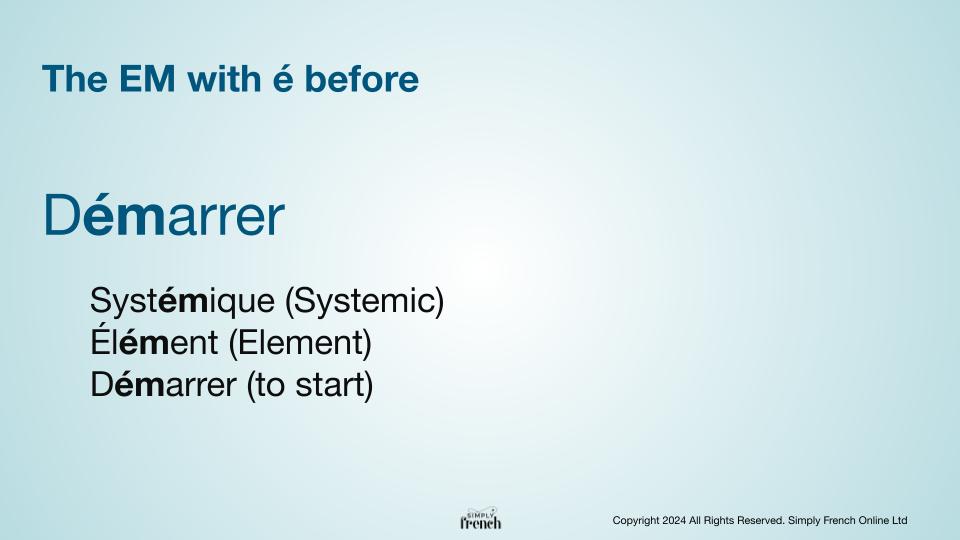
The EM with a consonant after.
In this case, you deal with a nasal sound. And the only consonants you will see will be the letter P or B.
Here are a few examples:
- emploi >>> job
- empreinte >>> imprint
- remplir >>> to fill
- emballage >>> packaging
- sembler >>> to seem
In a real context, you would see something like this:
- Son emploi demande beaucoup d’énergie. >>> Her job requires a lot of energy.
- Ils ont laissé une empreinte dans ce monde. >>> They left an imprint in this world.
- Mes parents ont rempli leur valise de cadeaux.>>> My parents filled their suitcases with gifts.
- L’emballage de ce parfum est magnifique. >>> The packaging of this perfume is very pretty.
- Tu sembles fatigué. >>> You seem tired.
Note that if you have the letter M after, the sound is like with the vowel after. In other words, it would be as if there were just an M (instead of 2).
- emmener >>> to bring
- J’ai emmené mon chien avec moi. >>> I brought my dog with me.
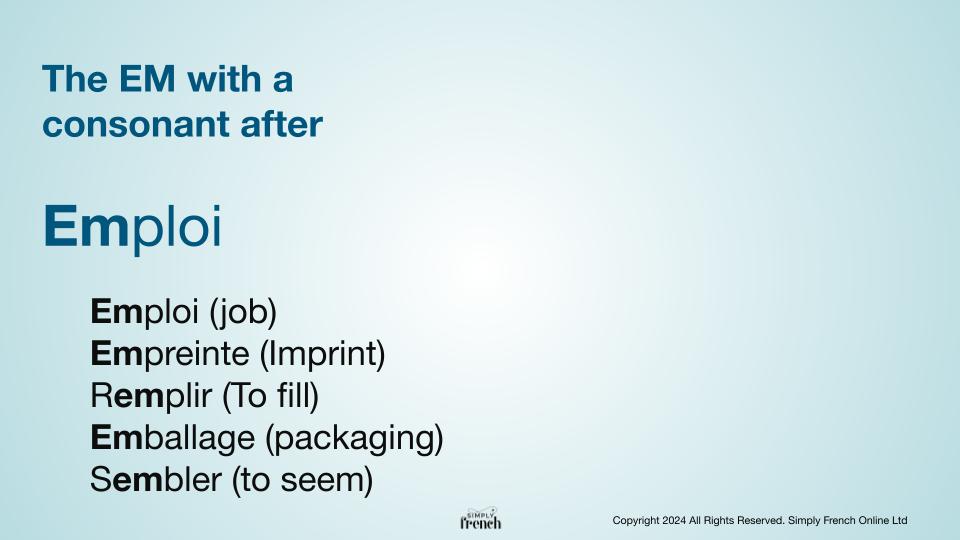
Practice the sound EM.
Time to practice. I invite you to record your voice while reading this text. Here’s the first part. After you have recorded it, check your pronunciation with the video.
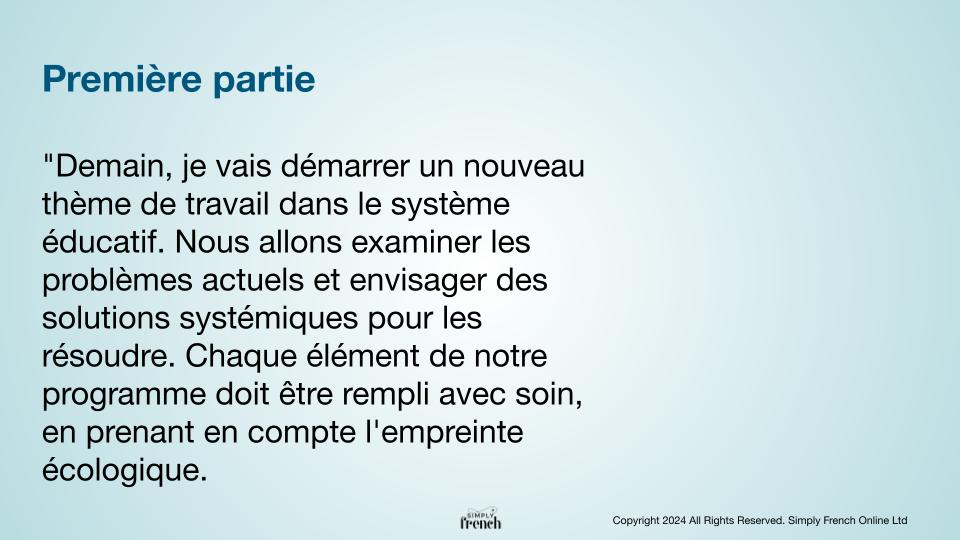
Now, do the same with the second part. Hopefully, you have used the correction of the first part to improve your pronunciation for this part.

If you are not sure you understand everything, here's the translation for you.
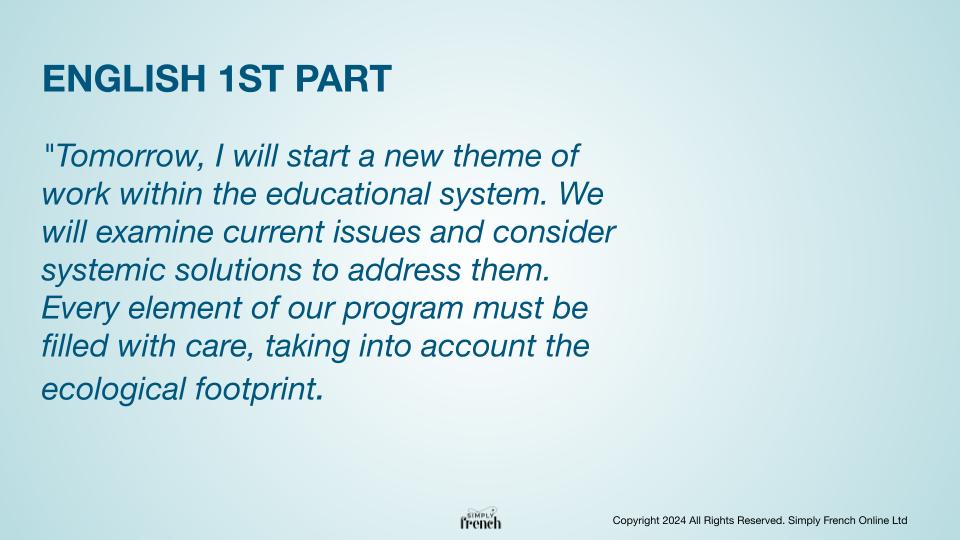
Here goes the second part.
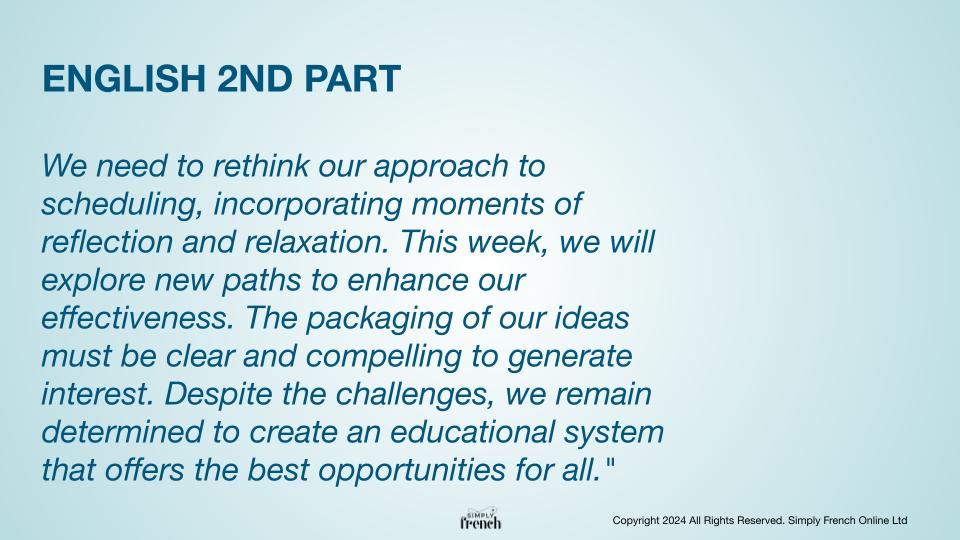
The following FREE masterclass is available to you to guide you through being able to speak French with confidence. And if you speak with more confidence, you also hear more easily - really. Take a peek . . . https://www.simplyfrenchonline.com head for LEARN and then Masterclass.
So, tell me, among the 4 ways to pronounce EM in French, which one(s) do you say naturally well?
Free Masterclass
Learn my 4 step method of how to hold meaningful french conversations the R.E.A.L. way in just 30 minutes a day.
When you signup, we'll be sending you weekly emails with additional free content

